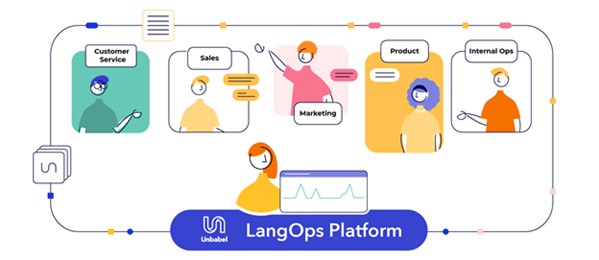
We’ve been working hard to change the future of language and its impact on your business. We’re now introducing a new technology category: LangOps.
Whether you’re aspiring to take your business to a global audience or planning to increase demand for your product in a new region, you know you need to communicate with your customers in their native language. However, some of the best-run businesses think of language as a barrier.
To drill deeper into language issues businesses face every day and possible solutions, we surveyed 1000+ business decision makers in mid-market and enterprise organizations across several industries and functions. We were proven right: In the 2021 Unbabel LangOps Survey, nearly a quarter of global business decision makers ranked language and cultural differences among their top five growth blockers, along with the prohibitive costs.
Not only that, the survey results also supported our vision for the future of language in businesses. At Unbabel, we believe that language is a growth driver: Language, when used correctly, can accelerate international expansion and increase customer satisfaction and brand awareness. To achieve this, you need the right strategy and platform.
Announcing a new market category: Language Operations (LangOps)
We know that, when expanding to capture new markets, businesses face several challenges in managing languages: the tremendous cost of adding new languages (say 44%), the lack of a clear single owner (36%), and the disconnected, decentralized process of incorporating new languages (36%). We’re thrilled to introduce a new discipline to solve these major challenges.
Language Operations (LangOps) is a holistic approach that enables organizations to leverage people, processes, and technology to enable multilingual communication.
“A decentralized, fragmented and siloed approach to language translation services simply doesn’t work anymore. For corporations like Microsoft, there’s a need and a desire to serve multilingual communication cross-functionally and operationally beyond customer service. Unbabel is driving this movement by breaking the language barrier and creating a centralized way to operationalize language more efficiently and at scale.”
— Vikram Nagaraj, Global Delivery Partner Manager at Microsoft
If you look around your organization, you can probably see at least three different approaches to multilingual communication. Maybe sales hires native speakers who need to be in the field. Product needs localization. Marketing is looking to translate parts of the website, piece by piece, with freelancers. Customer service is testing out machine translation to find the right fit. And each of these teams individually owns their piece of translation, so there’s no holistic view on what languages are working for you, where you should head next, and how you can streamline all these operations and bring more efficiency.
Traditional solutions, like language service providers and translation management tools, have been just enough to meet requirements. However, these approaches have not been enabling companies to go global. In our survey, decision makers specified that their current localization function falls short in quality (34%), speed (32%), and consistency (30%). And with the power of AI and a global community of editors, we want to think beyond the status quo.
Benefiting from a centralized LangOps function
With LangOps, we want to eliminate the disconnect and friction in the existing system by introducing a single, accountable owner: a LangOps manager or team. This can even be your existing localization professionals — all they’d need is to use an AI-powered LangOps platform like Unbabel. A LangOps platform offers customers a single dashboard with key language analytics providing comprehensive insights for all critical business functions, augmented machine translation tools and workflows enabling collaboration and optimization, and seamless integrations and APIs that plug into existing systems to incorporate translations into different communication channels.

By unifying all the translation and localization efforts across an organization, LangOps helps businesses scale into new markets quickly, add and manage languages efficiently and cost-effectively, and produce consistently high-quality translations at every touchpoint. It gives a business complete transparency and control over all the aspects of language in their organization.
Here’s what decision makers from globally operating organizations had to say about LangOps.
- LangOps would save money. More than 90% of those surveyed agree a centralized LangOps platform could be a cost-effective solution to do more with less.
- Centralized LangOps is valuable. More than 86% believe that a centralized LangOps team managing all the translation and localization efforts in their organization could be extremely or very valuable.
- LangOps is important for global market strategy. More than 90% of respondents agree that LangOps could be extremely or very important for their organizations’ global market strategy.
- The market feels confident about rapid adoption. More than half (52%) of respondents are so enthusiastic about LangOps that they would like to get a LangOps solution implemented within five or six months.
LangOps, the next stage
For years, we’ve been building tools and integrations at Unbabel that would help customer support teams excel using their existing workflows, in any language. And now, we’re uniquely positioned to spearhead the LangOps category in which AI-powered, human-refined machine translation technology serves as the centerpiece to power an entire organization’s language strategy. We can’t wait to share more innovation in this space.
With this new discipline, we’re ready to bring localization to the next level and help your business gain complete understanding of what language can do for their growth. Learn more.
About the Author
 Sophie Vu is Chief Marketing Officer at Unbabel. Unbabel helps customer support teams communicate with customers around the world, no matter what language they speak.
Sophie Vu is Chief Marketing Officer at Unbabel. Unbabel helps customer support teams communicate with customers around the world, no matter what language they speak.




